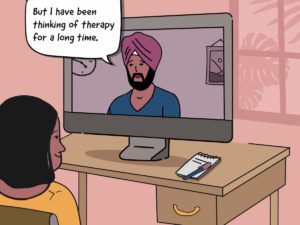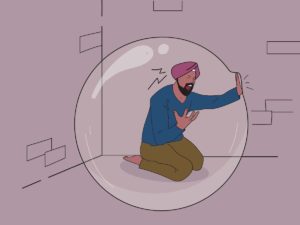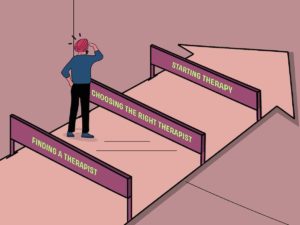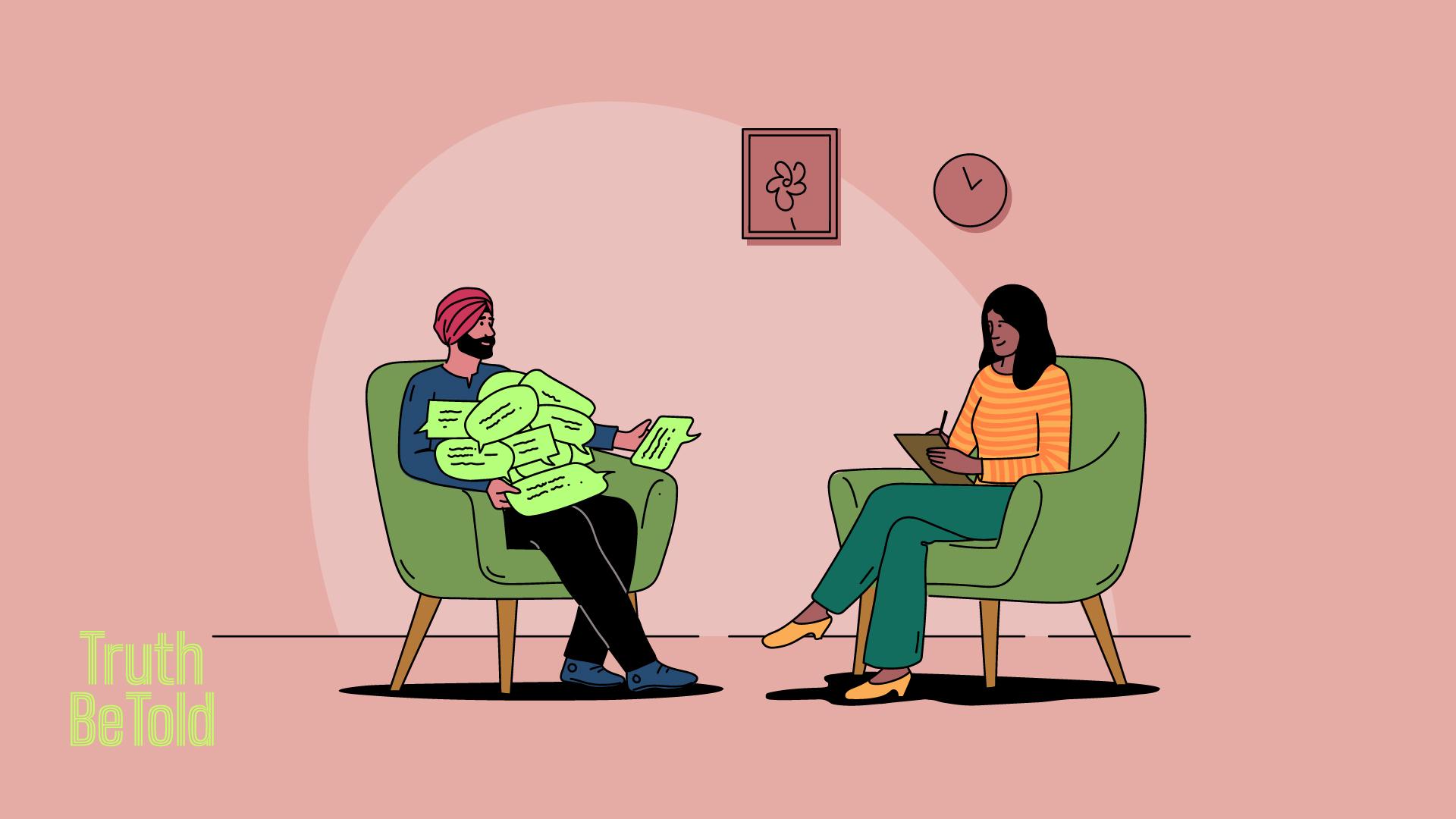How to find a good therapist?
A psychotherapist explains what clients experience when they come to therapy.
The most trustworthy source of food and
fitness journalism in the country.
Welcome to Truth Be Told, a weekly food & fitness newsletter. New here? Read our manifesto: a note on why we exist.
Editor’s note: Many who want to go for therapy often struggle to find a good therapist. If you or someone you know has been through that, you know it.
So we asked psychotherapist Aruna Gopakumar, the author of the book ‘And How Do You Feel About That?’ to share an approach for this hunt. In this piece, she especially focuses on the significance of the first few sessions to understand if the relationship with the therapist is working or not, and the questions you can ask them and you should ask yourself to figure that out.
‘Health’ is not just about physical health — mental health is equally important, and we intend to write more on it. Today’s piece is a start. As always, I look forward to your feedback and thoughts.
‘Hello!’ I said cheerily as I picked up a call from an unknown number.
My cheery energy was met with silence. I heard heavy breathing on the other end of the line, and I could sense an anxious person’s hesitation.
I waited a few seconds and said hello again.
That jolted the other into speaking, ‘Huh, hello. I am Abhi, and my aunt asked me to call you.’
‘Well, yes, she told me you would be calling.’
A heavy silence followed for a few seconds, and then Abhi blurted nervously, ‘I have never done this, so I don’t know how it works. What happens now?’
I sensed a high level of anxiety.

Much can be learnt quickly about a client by attending to how they show up in the first contact. At this moment, Abhi needed structure and reassurance.
I said, ‘Why don’t I send you an email on how I work, and then we meet on zoom to ask me any questions, and you could then decide if this is what you are looking for?’
This offer let Abhi know I treated him as an autonomous individual with self-agency. He had rights. He recognised that the initial session did not mean he needed to continue with me.
I send clients a comprehensive note explaining what psychotherapy is and is not. It also contains administrative details such as fees, cancellation clauses etc. It serves as a form of consumer education. Many clients are unaware they have a right to ask questions of the therapist.
Also, they often feel one down in relation to the therapist — they are distressed and feel vulnerable, and experience the therapist as having authority and power, sometimes even magic. A note like this addresses any anxiety about the therapeutic process itself. And reminds them that they have choices. Dealing with process-related anxiety can free up energy for the actual work that needs to be done with the client.
Like what you see so far?
Get TBT articles in your inbox every Saturday
A week later, a very guarded, unsmiling, 30-year-old man appeared on my screen on zoom.
I smiled gently and asked, ‘Are you here by choice?’
‘Yes. Why do you ask?’ His curiosity was piqued. The guard dropped a little.
‘You are not smiling.’
He smiled, relaxing further.
‘And you said your aunt asked you to meet me,’ I added.
‘She gave me your reference. But I have been thinking of therapy for a long time.’

‘What made you think of it?’ I seek from the start to engage the client in an active sense of a mutual working relationship. I want to facilitate a relaxed, directed conversational mode that promotes questioning, exploring and learning.
Abhi was more relaxed now, ‘I am extremely anxious. I worry that people are judging me all the time. I think a million times before I ask someone for something. I feel I am pushing them or bothering them. I feel people will exploit me, so I should protect myself. I feel tired with all this thinking and don’t feel like getting out of bed some days.’
‘How long have you been feeling this?’
‘The earliest I can remember is high school days, but it has become intense in the last few years.’
‘So, did you consider therapy earlier?’
In the first session, one of my key goals is to assess fears and anxieties around the therapy process.
‘No. I never knew it was an option. I kept wondering if what I felt was normal. I was dying to ask people if they felt this way too, but I was worried they would judge me. Even three years back, I thought about it but second-guessed myself. My thoughts were: Is it so bad that someone needs to help me? Is it so bad that I need to pay someone to listen to me? Will people judge me for needing help?’
‘And what changed now?’
‘I really need help. I can’t function.’

I felt sad to hear that. I know how much people struggle with themselves before reaching out for help. I wish for a world where when people struggle, they have easy access to safe spaces where they can express what is going on for them and make meaning of it without fearing any negative consequences.
Dealing with emotions as we experience them can prevent distress from escalating.
Abhi continued, ‘And I am really glad you didn’t discuss the fee directly with my aunt. In fact, my aunt said you didn’t discuss anything with her but asked her to tell me to call you.’
‘Yes.’
‘Why did you do that?’
‘You are an adult, aren’t you? If I am working with you, you are the only person who needs the details.’
Tears pooled in his eyes. I waited, looking at him compassionately. Therapists don’t rush in to soothe when patients are crying. Quite the contrary: we invite clients to step into the pain, offering containment so they can experience it fully and then explore what meaning it holds for them.
‘Tell me what makes you sad.’
Asking that question became permission for the tears to pour down his cheeks. He was still silent, unable to speak with the intensity of the sadness that he was experiencing.
‘If your tears had a voice, what would they be saying?’
‘That nobody trusts me really. They just boss me around. And any money that I spend is always analysed if it is too much. Anything to do with me is “too much”.’
There was already material to explore. But we hadn’t reached a contract yet. We don’t start work without a clear contract. That is protective of the client and the therapist.
‘I can see there is a lot to be explored here.’ I held the silence for a few minutes.
‘How do you feel sharing this with me?’
‘Surprisingly okay. I didn’t think I would feel okay with crying.’
‘You don’t let yourself cry?’
‘Actually, I am not surprised that I cried. I am surprised that I felt okay crying in front of you.’
‘You were worried I would judge you,’ I said soothingly.
‘I was.’

‘Thanks for letting me know about your fear of judgment and your okay-ness with being seen in your vulnerability.’
He smiled at me gratefully. I could see that my strokes reassured him that he was okay.
‘So I would like to work with you. How will this work?’
‘We will contract or reach an explicit understanding of what you want for yourself. You can share with me what is going on for you, and we will explore your patterns and meaning-making. For instance, you just shared that you were “too much”. We could explore what that means and why you believe that.’
‘Will you make me do things? Like, talk to empty chairs?’
I smiled. ‘Listen to your question. “Will you make me do things?” What do you believe is my power relative to you here?’
‘I can see what you are getting at. I am making you more powerful than me here.’
Abhi was quick to understand an unconscious process.
‘And discounting your agency. If I asked you to speak to an empty chair, what would you really like to say?
‘No!’ Abhi laughed nervously.
‘And what would stop you from saying it?’
‘I don’t know if I can disagree with you. I think you know what is good for me, and I need to follow that.’
‘What is good for you is that you show up as you. We are equal partners in the process. My goal is for you to recognise and own the agency you have in your life to make choices about you that make you feel confident, and you can experiment with that in our relationship.’
‘So if I don’t want to do what you ask me to do, can I refuse?
‘Smiling – looks like you need my permission for that. Of course, you can.’
‘But what if I am wrong.’
‘We will slow it down and explore your thinking and meaning-making. I will also share my thinking and meaning-making. We could negotiate as two adults.’
‘That makes me relieved.’
‘What specifically makes you relieved?’
I maintain a conversational style to engage a client in active self-exploration. It disrupts the ideal parent fantasies and the ‘you’ll fix me’ expectations people often bring to therapy.
‘That I am not all too powerful, and you will also push back.’
‘See, this is what I am saying – We will explore what “all too powerful” means.’ You seem conflicted here. You want me to take charge. And yet you are scared that you won’t have a choice.’
‘Oh, this is a familiar conflict. It is not easy for me to trust people.’
‘Good awareness. And your sharing it with me, in a way, is trusting me.’
‘Oh,’ he said, surprised. The harsh inner critic prevents us from accounting for positives.
‘So what is really my role in the therapy process?’
‘Your role is to show up! Tell me what change you are seeking. And then you share what is really going on for you, make meaning of it along with me. And share with me what is working or not working for you in our work together.’
‘I am feeling anxious.’
‘Tell me what the anxiety is about.’
‘I am worried if I will put pressure on myself week on week to make progress.’
‘Then we will explore what the pressure is about. Therapy is not just about the content. It is also about the process. We’ll work actively with what emerges between us as our relationship develops. Either of us, at any time, can address our relationship directly: conflicts, appreciations, mistakes, impatience, excitement, misunderstandings — whatever may affect the quality and effectiveness of our relationship.’
And we began our work.
Finding a therapist is the first hurdle to cross when you think of therapy.
You could ask someone you trust or reach out to organisations that offer therapy services.
There are also multiple approaches available in the market: Transactional Analysis, CBT, and Expressive Arts — you could be confused. I would say try a few and see what works for you.
Of the ones available, finding the right one for you is the second hurdle to cross. Your role in this process is to think about your goals ahead of time.

And use the first few sessions to understand if the therapist is right for you. Ask questions about things that matter. You can ask your therapist questions about their qualifications, experience, and approaches.
I wrote this to help those thinking about therapy understand the significance of the first few sessions to arrive at a working alliance with their therapist. You have the right to ask questions of your therapist and have a right to say no. You can leave therapy anytime but discuss the process openly with your therapist.
This is important because sometimes your feeling upset or unhappy with your therapist may result from your entrenched patterns. A good therapist can help you make sense of that and use these ruptures to help you understand yourself, connect to old wounds, and heal.
The first session sets the therapeutic stage.
In this session, a good therapist usually contracts by surfacing a client’s fears and hopes for what therapy can offer. You will also get a sense of their style by how they are with you.
In the initial session, the client will experience me recognising their strengths, confronting them where necessary, offering observations, and asking for their goals in therapy. From the start, my style is typically inquisitive, direct and quite confrontational. In this way, the client gets a sample of what will come if we continue working together.
People often ask me how they should choose a therapist. Here are some of my markers to identify a good therapist:
– Does the therapist invite you to feel okay about yourself by seeing you and accepting you as you are?
– Does the therapist keenly listen and help you make meaning of what is happening in the here and now?
– Does the therapist attend to what is working or not working for you?
– Does the therapist establish an avenue to discuss the therapist/client relationship actively?
Pay close attention to your emotional responses to the therapist. No matter how many professional accreditations your therapist has, your feelings of trust and comfort should be your top priority.
Will the therapy be uncomfortable from time to time? It will be. The therapist will invite you to step into your discomfort so that it can be explored and you can find a way out of some of your challenges.
But if you feel uncomfortable with your therapist for any other reason, it’s all right to look for someone else. You don’t need a reason to switch therapists. It’s enough that you don’t feel comfortable.
More on Truth be Told
Everyone has an opinion on your body. But why?
Is modern-day bread even food?
The Ultimate Guide to Parkour for beginners
Does refrigeration kill nutrition?
Want to become fit? Start with your ‘why’
Resolutions don’t work. Habits do.
Beware: New Year marketing is here!
Safest cooking utensils for healthy living


